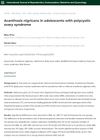 3 citations,
September 2021 in “International Journal of Molecular Sciences”
3 citations,
September 2021 in “International Journal of Molecular Sciences” Androgens and a high-fat diet may increase the risk of severe COVID-19 in women with PCOS by upregulating certain proteins in the heart and kidneys.
 August 2023 in “Journal of Clinical Medicine”
August 2023 in “Journal of Clinical Medicine” Metformin lowers prolactin in women without PCOS but not in those with PCOS, where it reduces other hormones instead.
 47 citations,
September 2022 in “European Heart Journal”
47 citations,
September 2022 in “European Heart Journal” Women may need different blood pressure guidelines than men for heart disease prevention.
 23 citations,
September 2021 in “Frontiers in Cellular and Infection Microbiology”
23 citations,
September 2021 in “Frontiers in Cellular and Infection Microbiology” Testosterone's effects on COVID-19 are unclear and need more research.
 13 citations,
November 2021 in “Frontiers in Immunology”
13 citations,
November 2021 in “Frontiers in Immunology” Melatonin could be an effective treatment for Alzheimer's Disease and rosacea.
8 citations,
November 2019 in “Clinical Science” High DHA levels delay wound healing and worsen skin repair quality.
 5 citations,
October 2022 in “Heliyon”
5 citations,
October 2022 in “Heliyon” Polycystic ovary syndrome, a disorder causing menstrual issues and infertility, can be treated with lifestyle changes, medication, herbal remedies, surgery, and assisted reproductive techniques like artificial insemination and IVF.
 5 citations,
October 2021 in “Journal of Ovarian Research”
5 citations,
October 2021 in “Journal of Ovarian Research” Cinnamon can help manage symptoms of polycystic ovary syndrome, improve menstrual cycles and fertility, and positively affect cholesterol and blood sugar levels, but more research is needed to confirm these effects and find the best dosage.
 5 citations,
January 2020 in “Bioscience Reports”
5 citations,
January 2020 in “Bioscience Reports” Certain changes in the VEGF gene can increase or decrease the risk of polycystic ovary syndrome.
 4 citations,
January 2023 in “Journal of Human Hypertension”
4 citations,
January 2023 in “Journal of Human Hypertension” Women experience more side effects and have worse blood pressure control from hypertension treatments than men, despite using different medications.
4 citations,
December 2021 in “Pharmacological Reports” Metformin is less effective in men with early-onset hair loss.
 3 citations,
May 2023 in “Biomedicines”
3 citations,
May 2023 in “Biomedicines” PCOS causes infertility mainly due to hormonal imbalances, insulin resistance, and chronic inflammation.
2 citations,
August 2022 in “Middle East Fertility Society Journal” The new rodent model successfully mimics non-lean human PCOS symptoms.
1 citations,
January 2024 in “International journal of molecular sciences” MicroRNAs could be key biomarkers and therapeutic targets for PCOS.
 1 citations,
October 2021 in “Prilozi - Makedonska akademija na naukite i umetnostite. Oddelenie za medicinski nauki”
1 citations,
October 2021 in “Prilozi - Makedonska akademija na naukite i umetnostite. Oddelenie za medicinski nauki” Many women with polycystic ovary syndrome have normal blood sugar, but some may have higher blood sugar levels or diabetes, especially if they are older, overweight, and have certain hormone levels.
 1 citations,
May 2021 in “International Journal Of Medical Science And Clinical Invention”
1 citations,
May 2021 in “International Journal Of Medical Science And Clinical Invention” Women with PCOS may have a higher risk of severe COVID-19 due to hormonal imbalances and vitamin D deficiency.
 January 2024 in “Biology of sex differences”
January 2024 in “Biology of sex differences” Dihydrotestosterone makes arteries stiffer in female mice by reducing estrogen receptor expression.
 November 2023 in “Biology”
November 2023 in “Biology” Lower hair copper and copper-to-zinc ratio are linked to more severe coronary artery disease.
 August 2023 in “Medicina-lithuania”
August 2023 in “Medicina-lithuania” Abusing steroids can damage your heart, muscles, reproductive system, liver, skin, and brain, and may increase the risk of Alzheimer's disease.
 July 2023 in “International Journal of Endocrinology”
July 2023 in “International Journal of Endocrinology” Centratherum anthelminticum seed extract effectively treats Polycystic Ovary Syndrome in rats.
 July 2023 in “Journal of Clinical Medicine”
July 2023 in “Journal of Clinical Medicine” Tirzepatide might help manage PCOS in obese patients but needs more research to confirm safety and effectiveness.
 June 2023 in “Pharmaceuticals”
June 2023 in “Pharmaceuticals” Men and women respond differently to drugs for COVID-19, high cholesterol, and diabetes, which suggests a need for personalized treatments.

Women with Polycystic Ovary Syndrome (PCOS) have a higher risk of developing type 2 diabetes due to insulin resistance.
 October 2022 in “Springer eBooks”
October 2022 in “Springer eBooks” The document concludes that personalized hormonal treatments are important for transgender individuals and more research is needed for non-binary treatments.
 February 2022 in “International journal of reproduction, contraception, obstetrics and gynecology”
February 2022 in “International journal of reproduction, contraception, obstetrics and gynecology” Acanthosis nigricans in teenage girls with PCOS is a sign of obesity, not insulin resistance or glucose intolerance.
 January 2021 in “ISGE series”
January 2021 in “ISGE series” Polycystic ovary syndrome causes chronic inflammation affecting all body systems, but proper nutrition, exercise, and supplements can improve the condition.
 December 2023 in “Regenerative therapy”
December 2023 in “Regenerative therapy” miRNA-based therapies show promise for treating skin diseases, including hair loss, in animals.
 318 citations,
January 2022 in “Signal Transduction and Targeted Therapy”
318 citations,
January 2022 in “Signal Transduction and Targeted Therapy” The Wnt/β-catenin pathway is important for body functions and diseases, and targeting it may treat conditions like cancer, but with safety challenges.
 50 citations,
January 2013 in “Indian Journal of Dermatology”
50 citations,
January 2013 in “Indian Journal of Dermatology” Some skin conditions, like psoriasis and early-onset baldness, may indicate metabolic syndrome, and others are linked to diabetes risk and cardiovascular issues.
 43 citations,
December 2020 in “PLOS Genetics”
43 citations,
December 2020 in “PLOS Genetics” New method finds genetic links between Type 2 Diabetes and Prostate Cancer not seen before.

























